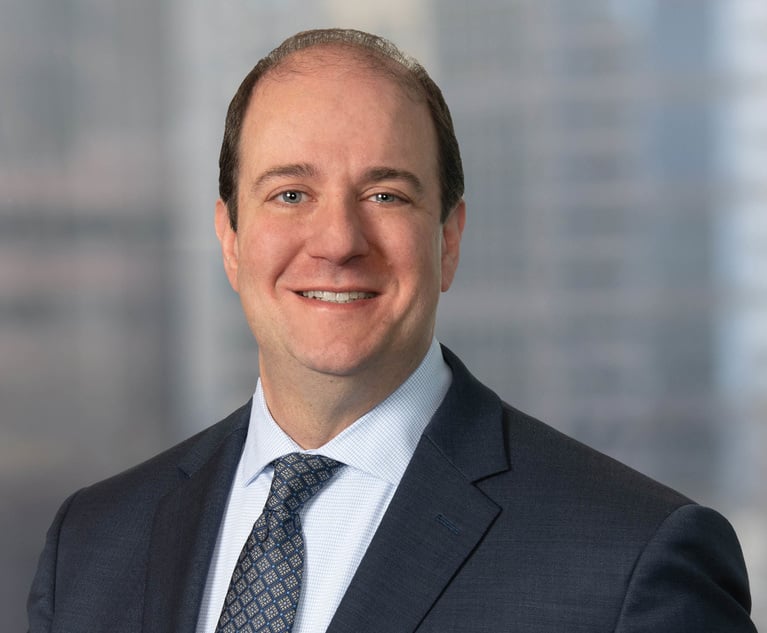Under New DOJ Policy, FDA Guidance Documents Cannot be Used to Prosecute Cases
On Jan. 25, the associate attorney general of the United States issued a policy that prohibits the Department of Justice (DOJ) civil litigators from using guidance documents to establish violations of law in civil enforcement actions.
February 09, 2018 at 04:08 PM
6 minute read

On Jan. 25, the associate attorney general of the United States issued a policy that prohibits the Department of Justice (DOJ) civil litigators from using guidance documents to establish violations of law in civil enforcement actions. In other words, the newly issued policy forbids department litigators from using its civil enforcement authority to convert guidance documents issued by governmental agencies into binding rules.
The policy follows a memorandum issued by Attorney General Jeff Sessions on Nov. 16, 2017. In the memorandum, Sessions specifically noted that it came to his attention that “the department has in the past published guidance documents—or similar instruments of future effect by other names, such as letters to regulated entities—that effectively bind private parties without undergoing the rulemaking process.” He explained that when agencies side-step the requirement to use the notice-and-comment rulemaking process set forth in the Administrative Procedure Act, they are not abiding by the required principle that “agencies regulate only within the authority delegated to them by Congress.” For these reasons, AG Sessions declared that the “department [of Justice] will no longer engage in this practice.” He stated that the department will not issue guidance documents that purport to create rights or obligations that bind persons or entities outside of the executive branch. In the memorandum, AG Sessions also set forth numerous principles about which the department shall adhere when issuing guidance documents.
In the Jan. 25 policy, the principles set forth in AG Sessions' memorandum are further applied to DOJ litigators who utilize guidance documents in affirmative civil enforcement actions. The civil litigators were definitively informed that “guidance documents cannot create binding requirements that do not already exist by statute or regulation” and may not “convert agency guidance documents into binding rules.” Moreover, the DOJ litigators were instructed that they are not permitted to use noncompliance of agency guidance documents as a basis for proving violations in affirmative civil enforcement cases.
This DOJ policy is applicable to the life sciences law practice area because the U.S. Food & Drug Administration (FDA) routinely issues guidance documents for all areas under its control, including food, cosmetics, veterinary products, drugs, medical devices, and vaccines, blood and biologics, among others. The FDA usually publishes a “draft” guidance document about a particular topic and provides a comment period before issuing a “final” guidance document. Prominently displayed on the FDA's website is the following statement: “Guidance documents represent the agency's current thinking on a particular subject. They do not create or confer any rights for or on any person and do not operate to bind FDA or the public. An alternative approach may be used if such approach satisfies the requirements of the applicable statute, regulations, or both.”
This statement conforms with the principles set forth in the recent DOJ policy. A similar statement is also included at the beginning of every guidance document issued by the agency.
One of the most recently issued “final” drug guidance documents from the FDA falls under the category of labeling and is titled “Product Name Placement, Size, and Prominence in Advertising and Promotional Labeling.” Another recent “final” guidance sets forth the FDA's policy for licensed pharmacists or physicians that compound drug products that are essentially copies of commercially available drugs. Some examples of current “draft” drug guidances available for comment are “Good ANDA Submission Practices” for Generic Drug Manufacturers and “Drug Products Labeled as Homeopathic.” On Jan. 19, the FDA's Center for Drug Evaluation and Research (CDER) published a Guidance Agenda for the 2018 calendar year. Among the list of guidances that the CDER is expecting to publish are:
- Presenting quantitative information in direct-to-consumer promotional labeling and advertisements
- Updating promotional materials to reflect labeling changes to risk information
- Opioid dependence: developing depot buprenorphine products for treatment
- Meta-analysis of randomized controlled clinical trials to evaluate the safety of human drugs or biologic products
- Instructions for use for human prescription drug and biological products—content and format
The new DOJ policy will likely have an effect on the amount of governmental actions brought against pharmaceutical companies, like qui tam claims under the Federal False Claims Act. Undeniably, DOJ civil litigators have been instructed by their superiors that noncompliance with FDA guidance documents cannot be utilized as a basis for proving violations in affirmative civil enforcement actions against pharmaceutical companies. Moreover, pharmaceutical companies will likely point to the newly issued DOJ policy in defending themselves against governmental actions that have been filed against them.
Of importance, the DOJ policy ends by stating that it applies only to DOJ components and employees and “is not intended to, does not, and may not be relied upon to, create any rights, substantive or procedural, enforceable at law by any party in any matter civil or criminal.” In civil litigation pharmaceutical products liability lawsuits, both plaintiffs and defendants often attempt to utilize FDA guidance documents to either prosecute or establish a defense in their cases. As a practical consideration, if the government is not permitted to utilize the guidance documents to prove alleged violations against pharmaceutical companies, why should plaintiffs in product liability lawsuits be permitted to do so? Likewise, defendants should continue to expect vigorous opposition to their efforts to offer guidance documents as substantive evidence when appropriate. Indeed, it remains to be seen if the closing statement of the DOJ policy will have a significant effect on pharmaceutical product liability cases going forward. But it is clear that FDA regulatory experts in these lawsuits will likely be questioned about their understanding of the differences between regulations and guidance documents if their opinions are based upon FDA guidances.
Megan E. Grossman is a shareholder at Segal McCambridge Singer & Mahoney in its Philadelphia office. She is the chair of the firm's life sciences practice group and she focuses her practice on the defense of pharmaceutical and medical device companies in products liability lawsuits.
This content has been archived. It is available through our partners, LexisNexis® and Bloomberg Law.
To view this content, please continue to their sites.
Not a Lexis Subscriber?
Subscribe Now
Not a Bloomberg Law Subscriber?
Subscribe Now
NOT FOR REPRINT
© 2025 ALM Global, LLC, All Rights Reserved. Request academic re-use from www.copyright.com. All other uses, submit a request to [email protected]. For more information visit Asset & Logo Licensing.
You Might Like
View All

Trending Stories
- 1States Accuse Trump of Thwarting Court's Funding Restoration Order
- 2Microsoft Becomes Latest Tech Company to Face Claims of Stealing Marketing Commissions From Influencers
- 3Coral Gables Attorney Busted for Stalking Lawyer
- 4Trump's DOJ Delays Releasing Jan. 6 FBI Agents List Under Consent Order
- 5Securities Report Says That 2024 Settlements Passed a Total of $5.2B
Who Got The Work
J. Brugh Lower of Gibbons has entered an appearance for industrial equipment supplier Devco Corporation in a pending trademark infringement lawsuit. The suit, accusing the defendant of selling knock-off Graco products, was filed Dec. 18 in New Jersey District Court by Rivkin Radler on behalf of Graco Inc. and Graco Minnesota. The case, assigned to U.S. District Judge Zahid N. Quraishi, is 3:24-cv-11294, Graco Inc. et al v. Devco Corporation.
Who Got The Work
Rebecca Maller-Stein and Kent A. Yalowitz of Arnold & Porter Kaye Scholer have entered their appearances for Hanaco Venture Capital and its executives, Lior Prosor and David Frankel, in a pending securities lawsuit. The action, filed on Dec. 24 in New York Southern District Court by Zell, Aron & Co. on behalf of Goldeneye Advisors, accuses the defendants of negligently and fraudulently managing the plaintiff's $1 million investment. The case, assigned to U.S. District Judge Vernon S. Broderick, is 1:24-cv-09918, Goldeneye Advisors, LLC v. Hanaco Venture Capital, Ltd. et al.
Who Got The Work
Attorneys from A&O Shearman has stepped in as defense counsel for Toronto-Dominion Bank and other defendants in a pending securities class action. The suit, filed Dec. 11 in New York Southern District Court by Bleichmar Fonti & Auld, accuses the defendants of concealing the bank's 'pervasive' deficiencies in regards to its compliance with the Bank Secrecy Act and the quality of its anti-money laundering controls. The case, assigned to U.S. District Judge Arun Subramanian, is 1:24-cv-09445, Gonzalez v. The Toronto-Dominion Bank et al.
Who Got The Work
Crown Castle International, a Pennsylvania company providing shared communications infrastructure, has turned to Luke D. Wolf of Gordon Rees Scully Mansukhani to fend off a pending breach-of-contract lawsuit. The court action, filed Nov. 25 in Michigan Eastern District Court by Hooper Hathaway PC on behalf of The Town Residences LLC, accuses Crown Castle of failing to transfer approximately $30,000 in utility payments from T-Mobile in breach of a roof-top lease and assignment agreement. The case, assigned to U.S. District Judge Susan K. Declercq, is 2:24-cv-13131, The Town Residences LLC v. T-Mobile US, Inc. et al.
Who Got The Work
Wilfred P. Coronato and Daniel M. Schwartz of McCarter & English have stepped in as defense counsel to Electrolux Home Products Inc. in a pending product liability lawsuit. The court action, filed Nov. 26 in New York Eastern District Court by Poulos Lopiccolo PC and Nagel Rice LLP on behalf of David Stern, alleges that the defendant's refrigerators’ drawers and shelving repeatedly break and fall apart within months after purchase. The case, assigned to U.S. District Judge Joan M. Azrack, is 2:24-cv-08204, Stern v. Electrolux Home Products, Inc.
Featured Firms
Law Offices of Gary Martin Hays & Associates, P.C.
(470) 294-1674
Law Offices of Mark E. Salomone
(857) 444-6468
Smith & Hassler
(713) 739-1250







